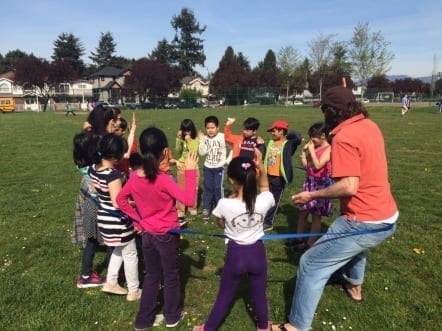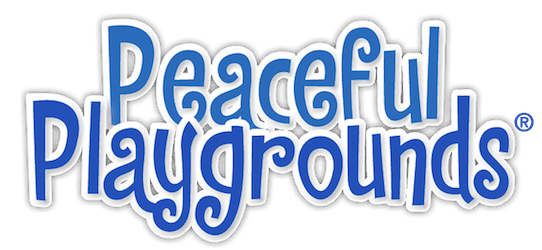Peaceful Playgrounds
 I recently read a publication in the NY Times Sunday Review called My Kid’s First Lesson in Realpolitik. Annie Pfeifer is a parent bemoaning the need for our children to stand up to bullies. There is recognition of the fact that “helicopter parents” swoop in with speed and vehemence to deal with any conflict, big or small, that his / her child may encounter. The alternative presented is to let kids fight it out, like on the playgrounds in Switzerland, so they learn how to deal with conflict. It is my position that both of these options fail to provide our children with the confidence or skills to deal with conflict. Our kids need educators and families to work together to provide the guidance and mentoring to teach kids how to resolve a conflict.
I recently read a publication in the NY Times Sunday Review called My Kid’s First Lesson in Realpolitik. Annie Pfeifer is a parent bemoaning the need for our children to stand up to bullies. There is recognition of the fact that “helicopter parents” swoop in with speed and vehemence to deal with any conflict, big or small, that his / her child may encounter. The alternative presented is to let kids fight it out, like on the playgrounds in Switzerland, so they learn how to deal with conflict. It is my position that both of these options fail to provide our children with the confidence or skills to deal with conflict. Our kids need educators and families to work together to provide the guidance and mentoring to teach kids how to resolve a conflict.
Playgrounds serve to be a microcosm of the world where our kids learn important lessons. They are filled with students who are human.
Perfection may not be possible but the aspiration to create a peaceful playground is paramount. We want our future generation to accept that everyone is invited to the party and we all need to learn to co-exist peacefully to create a better reality. A playground is a relatively small fishbowl and a good place to learn about kindness, acceptance, tolerance and to develop problem-solving skills.
Peaceful playground requires:
- kindness
- communication skills
- compassion
- empathy
- inclusivity
- compromise
- sharing space, equipment, and friends
- an ability to express feelings, while considering other people’s feelings
- an ability to understand when you need to self-calm and practice those skills
- problem-solving skills
- ability to follow safety rules and game rules
 Of course, the list could go on. We have a number of programs and theories to help us navigate this course. School Codes of Conduct are mandatory in schools in British Columbia and are widely published on school websites. Articles and tweets about the topic of self-regulation have become common. @Stuart Shanker has committed to tweeting a daily quote #SelfReg to encourage us to pursue and gain a greater understanding of root causes of our feelings and how to deal with them.
Of course, the list could go on. We have a number of programs and theories to help us navigate this course. School Codes of Conduct are mandatory in schools in British Columbia and are widely published on school websites. Articles and tweets about the topic of self-regulation have become common. @Stuart Shanker has committed to tweeting a daily quote #SelfReg to encourage us to pursue and gain a greater understanding of root causes of our feelings and how to deal with them.
I particularly like The Zones of Regulation program developed by Leah Kuypers, to teach kids that feeling emotions is never a bad thing but we require strategies to deal with them in ways that keep others and ourselves safe. If you are very angry and in the “Red Zone”, your job is to self-calm before you try to problem solve. Kids are fascinated to learn that “yoga” or slow breathing actually causes your brain to calm your body. Science at work!
The Peaceful Playgrounds Program is another program that I really like. Basic messages are framed in a way for kids to easily remember and apply on the playground. It also includes a plethora of ideas of things to keep kids active and problem-solving on the playground. Problem-solving strategies that you probably remember from your own childhood.
- Talk
- Walk
- Rock, Papers, Scissors ( Yes, you commit on 3 – agreed upon rule! ) In several of my other schools, this was known as Ching, Chang, Push showing this is also a well-established strategy on China too!
War Toys To Peace Art is a group established to fund art projects by peace-loving groups of children. The Friendship Bench is one way for kids to find their way into playground activity if they need some additional support. A bench is designated as space for kids to demonstrate kindness by inviting kids looking for a friend looking for someone to play with. Programs like Jump Rope for Heart give kids a focus and the equipment to get involved in healthy playground activity.
Kids are human and sometimes they will need help resolving conflicts face to face AFTER they have calmed down. When kids don’t make good choices, they need the opportunity to own them. Kids need to be able to express how they are feeling and what they didn’t like in face to face conversations. They also need to learn to listen to other opinions, how the choices he/she made impacted the other person and to develop strategies for how to repair relationships. They also need to learn to move forward after they have dealt with the problem. Adults are there to support kids in dealing with the problems. The goal is for kids to develop the skills to problem solve and the confidence that they can. Adults are involved in the process to ensure that name calling and bullying (physical and emotional ) do not become an accepted norm.


